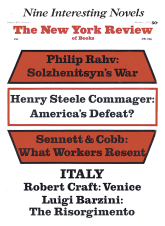To the Editors:
Is the scholar human?
I am asking this interesting question because after five months of waiting I have finally received the refusal of my application for permission to go to Israel. As “an important specialist” I am not allowed to emigrate.
It is not up to me to judge my quality as a Sinologist. May I list some facts concerning the fate of this “important specialist” in the Soviet Union? For the last three years I worked in the Institute of Oriental Studies of the Academy of Sciences as a temporary senior researcher although this title was never confirmed. When in January 1972 I informed my chief that I was going to apply to settle in Israel, he insisted on my leaving my position immediately. I resigned on February 1, and since then I haven’t worked and cannot earn my living. All my works have since been withdrawn from printing (among them are the Russian translation of the first three books of “Ch’un Ch’iu” and “Tso Chuan,” with commentaries, the articles: “The Problem of Culture in Ancient Chinese Thinking”; “Shen Tao and Fa-chia”; “Approach of Ancient Chinese Philosophers to the Problem of Power”). Orders for reviews of my book Ideology and Culture in Ancient China (published in 1970) in two scholarly magazines were canceled; more than this, citations and mentions of my previous works were removed from all books and articles at the printer’s. The message is clear: such people as I are undesirable and are to be made non-existent in Soviet Sinology.
When Soviet authorities refuse to let Jewish scientists emigrate to Israel, they claim that these scientists have access to secret materials and that their emigration may be dangerous to the security of state. My materials however are Chinese classics, they are no more secret than the Bible or the tragedies of Shakespeare. I am deprived of my human rights therefore because I am a scholar.
I send this letter because I hope the treatment of your colleague does matter to you. Soviet leaders today often speak about the great importance of international cooperation among scientists and scholars, but it is difficult to understand how it is possible to appreciate knowledge and understanding and at the same time to deprive scholars of their human rights.
Vitali Rubin
Moscow, USSR
This Issue
October 5, 1972



